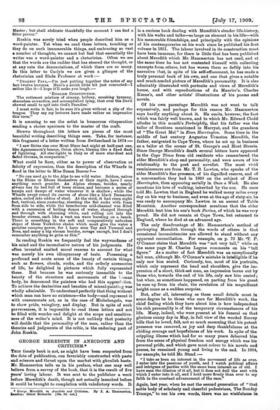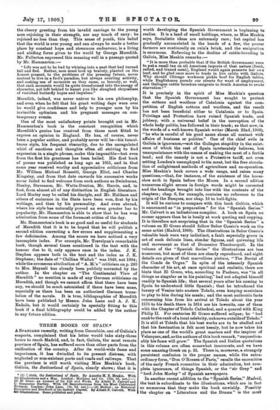GEORGE MEREDITH IN ANECDOTE AND CRITICISM.* This timely book is
not, as might have been suspected from the date of publication, one feverishly constructed with paste and scissors and thrust upon the market with ghoulish haste. Mr. Hammerton tells us in his preface, what one may well believe from a survey of the book, that it is the result of five years' loving labour. It was sent to the publisher a week before Meredith's death, though not actually launched before It could be brought to completion with valedictory words. It • George Meredith in Anecdote and Criticism. By J. A. Hammerton. London: Grant Richards. [128. 6d. net.]
is a curious book dealing with Meredith's slender life-history, with his walks and talks—so large an element in his life—with his memorable friendships, and principally with the opinions of his contemporaries on his work since be published his first volume in 1851. The labour involved in its construction must have been immense, for there is little that has been published about Meredith which Mr. Hammerton has not read, and at the same time he has not contented himself with collecting excerpts from others, but has woven them so deftly into his narrative that, in spite of his self-effacement, he has made a truly personal book of his own, and one that gives a notable and much-needed picture of Meredith's personality. It is also admirably illustrated with portraits and views of Meredith's house, and with reproductions of da Maurier's, Charles Keene's, and other artists' illustrations of his poems and novels.
Of his own parentage Meredith was not wont to talk expansively, and perhaps for this reason Mr. Hammerton says hardly anything about it. He omits, however, the fact which was fairly well known, and to which Mr. Edward Clodd alludes in this month's Fortnightly, that his father was the tailor of Southsea mentioned in Marryat, and the grandson of "The Great Mel" in Evan Harrington. Some time in the middle of last century Augustus Urmston Meredith, the father, emigrated to Cape Town, where he set up in business as a tailor at the corner of St. George's and Rout Streets. Since George Meredith's death several letters have appeared in the Cape Times from old residents who remembered the elder Meredith's shop and personality, and were aware of his relationship to the poet and novelist. The most vivid reminiscences are from Mr. T. B. Lawton, who speaks of the elder Meredith's fine presence, of his dignified reserve, and of a conversation they had in 1860 on the subject of Evan Harrington, then appearing serially in Once a Week. He also mentions his love of walking, inherited by the son. He once told Mr. Lawton that in England he walked many miles every day on his way to business, and even at the age of sixty-six he was ready to accompany Mr. Lawton in an ascent of Table Mountain. Another correspondent mentions that the elder Meredith lent him his son's book Farina, of which he was very proud. He did not remain at Cape Town, but returned to England, where he died at an advanced age.
The only disadvantage of Mr. Hammerton's method of portraying Meredith through the words of others is that occasional inconsistencies are allowed to stand without any apparent reconciliation. For example, on p. 73 Mr. T. P. O'Connor states that Meredith was "not very tall," while on the same page M. Charles Legras comments on his "tall figure." As a matter of fact Meredith was an exceptionally tall man, although Mr. O'Connor's mistake is intelligible if he only saw him seated. Curiously, too, most of his portraits, which only represent the head and shoulders, give the im- pression of a short, thick-set man, an impression borne out by those who, towards the end of his life, only saw him seated ; but when, as sometimes happened, on parting from his guest lie rose up from his chair, the revelation of his magnificent height came as a sudden surprise.
But, after all, interesting as these small details must in some degree be to those who care for Meredith's work, the chief feeling which they have about him is how independent his rich personality is of the temporary circumstances of his life. Many, indeed, who were present at his funeral on that glorious sunny day in May, in full view of the wooded Surrey hills that he loved, felt, not so much mourning that his potent presence was removed, as joy and deep thankfulness at the abiding courage and hopefulness of his work. In spite of the crippling illness which had for so many years debarred him from the sense of physical freedom and energy which was his personal pride, and which gave most colour to his novels and poems, he remained young and living to the end. In 1904, for example, he told Mr. Stead :— "I take as keen an interest in the movement of life as ever. I enter into the passions of youth, and I watch political affairs and intrigues of parties with the same keen interest as of old. I have seen the illusion of it all, but it does not dull the zest with which I enter into it all, and I hold more firmly than ever to my faith in the constant advancement of the race."
Again, last year, when he met the second generation of "that noble body of scholarly and cheerful pedestrians, The Sunday Tramps," to use his own words, there was no wistfulness in
the cheery greeting from his invalid carriage to the young men rejoicing in their strength, nor any touch of envy : he rejoiced no less than they. This sense of youth, this belief that the world is ever young and can always be made a better place by constant hope and strenuous endeavour, is a living and abiding force given to the world by George Meredith. Mr. Fullerton expressed this meaning well in a passage quoted by Mr. Hammerton
"Life was not to be had by whining into a past that had turned tail and fled. Rather, men must look up bravely, planted on the honest present, to the problems of the pressing future, never content to live in a fool's paradise, but always courting activity, and making use of moments as they came, so bravely, so well, that such moments would be quite transformed into the energy of character, not left behind to haunt you like sloughed chrysalises of vanished butterfly hopes and impulses."
Meredith, indeed, was never untrue to his own philosophy, and even when he felt that his great writing days were over he would give confidence and help to younger men by his invincible optimism and his pregnant messages on con- temporary events.
One of the most satisfactory points brought out in Mr. Hammerton's book is the constant recognition which Meredith's genius has received from those most fitted to express an opinion in England. He has, of course, never been a popular author, and probably never will be—his tumul- tuous style, his frequent obscurity, due to the unregulated whirl of emotions and thoughts often all striving to find expression in a single phrase, make this impossible—but even from the first his greatness has been hailed. His first book of poems was published as long ago as 1851, and in that same year received worthy and appreciative criticisms from Mr. William Michael Rossetti, George Eliot, and Charles Kingsley, and from that date onwards his successive works never failed to find welcome from such authors as Swinburne, Henley, Stevenson, Mr. Watts-Dunton, Mr. Barrie, and, in fact, from almost all of any distinction in English literature. Lord Morley may be called his disciple, and Mr. Haldane and others of eminence in the State have been won, first by his writings, and then by his personality. And even abroad, where his style has naturally proved an even greater bar to popularity, Mr. Hammerton is able to show that he has won admiration from some of the foremost critics of the day.
Mr. Hammerton's book is so good and 80 useful for students of Meredith that it is to be hoped that he will publish a
second edition correcting a few errors and supplementing a few deficiencies. Among the errors we have noticed a very incomplete index. For example, Mr. Trevelyan's remarkable book, though several times mentioned in the text with the honour due to it, only appears once in the index. J. K. Stephen appears both in the text and the index as J. K. Stephens; the date of " Chillian Wallah" was 1849, not 1894; while the erroneous attribution of "A. M.'s" criticism on p. 283 to Mrs. Meynell has already been publicly corrected by the author. In the chapter on "The Continental View of Meredith" no mention is made of any German criticisms on Meredith, and though we cannot affirm that there have been any, we should be much astonished if there have been none, especially as there has been an authorised German trans- lation of the novels. It is true, bibliographies of Meredith have been published by Messrs. John Lane and A. J. K. Esdaile, but it would certainly be specially fitting to this book if a final bibliography could be added by the author in any future edition.









































 Previous page
Previous page